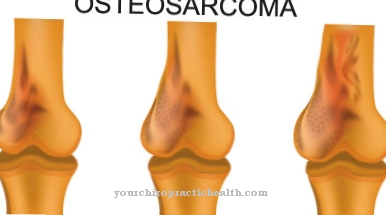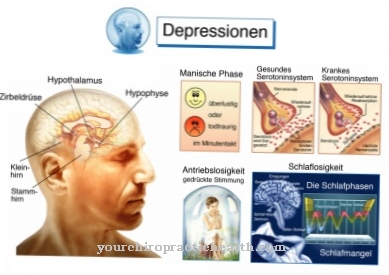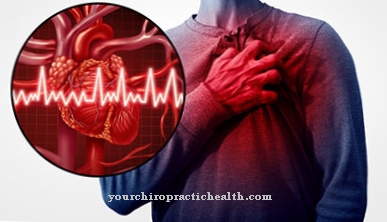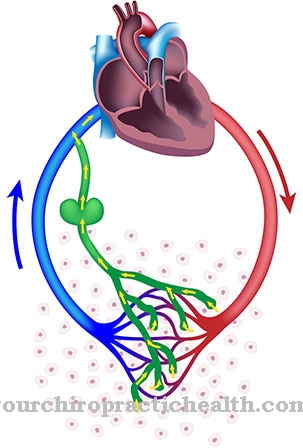The Anticholinergic Syndrome is a kind of intoxication phenomenon with neurological symptoms. The most common causes are drug overdoses or opiate use. In addition to gastric lavage, diuresis or therapy with activated charcoal are available for treatment.
What is Anticholinergic Syndrome?

© ake1150 - stock.adobe.com
The term "anticholinergic" means the opposite of the effects of acetylcholine. Acetylcholine is a neurotransmitter. Many stimuli within the central and peripheral nervous system are transmitted via this messenger substance. The contractions of the skeletal muscles, for example, are commissioned and implemented using this material. In addition, the messenger substance serves as a signal substance within the sympathetic and parasympathetic brain regions.
In the case of the anticholinergic syndrome, this signal transmission is disturbed. The parasympathetic nervous system switches off almost entirely as a result of the phenomenon. As a rule, this phenomenon occurs through the consumption of poisonous substances. The anticholinergic syndrome is a kind of poisoning phenomenon. Neurological symptoms shape the picture of the syndrome. Sometimes there is talk of mind-altering effects in this context.
causes
Most often, the anticholinergic syndrome occurs in the context of drug overdoses. However, the consumption of nightshade plants is also partly responsible for the appearance. Among the drugs, antidepressants and neuroleptics, as well as antihistamines and hyoscyamine have anticholinergic effects. Among the nightshade family, the deadly nightshade, angel's trumpet and henbane or thorn apple have antocholinergic effects.
The plants and drugs mentioned contain antagonists to the neurotransmitter acetylcholine and therefore have an inhibitory effect on the parasympathetic nervous system. In nightshade plants, the highly poisonous tropane alkaloid atropine is primarily responsible for the inhibiting effect. This substance competes with acetylcholine in the body and displaces the acetylcholine receptors. Atropine thus antagonizes the effects of natural acetylcholine and disrupts consciousness.
You can find your medication here
➔ Medicines to calm down and strengthen nervesSymptoms, ailments & signs
Patients with anticholinergic syndrome usually feel confused and disoriented. In addition to fear and restlessness, seizures often occur. Auditory and visual hallucinations or general movement disorders are also symptoms.
These symptoms of the syndrome form their own form of the phenomenon, which is often referred to as the delirious form. The somnolent form must be distinguished from this. It manifests itself in drowsiness or even coma. In extreme cases, breathing stops. Both forms of the phenomenon can be accompanied by symptoms such as dry, reddened or heated skin. Often both have a fever.
Sweat production can decrease and the pupils dilate. Glaucoma attacks or blurred vision are just as common. Other accompanying symptoms are swallowing disorders, cardiac arrhythmias and dry mouth due to reduced saliva production. In addition, the gastrointestinal tract and the bladder are often inhibited by the poisoning.
Diagnosis & course
The doctor differentiates between a peripheral and a central anticholinergic syndrome. In this context, peripheral and central refer to the respective involvement of the nervous system. The peripheral anticholinergic syndrome manifests itself, for example, mainly in hypertonia of the skeletal muscles. The central form, on the other hand, can contain strong changes in personality and clouding of consciousness, as it attacks the central nervous system's perception apparatus.
The course of the symptoms of intoxication depends heavily on the form. The prognostic form of the somnolent form of the syndrome is generally less favorable than the delirious form. Most of the time, patients with anticholinergic syndrome do not have all of the symptoms. Often their complaints are unspecific. The syndrome is therefore difficult to diagnose unless the history suggests it.
Both cerebral haemorrhage and inflammation in the brain can manifest themselves in similar symptoms. The physostigimin test can confirm the suspicion of an anticholinergic syndrome. The prognosis is generally good as long as the syndrome is recognized early. As a rule, permanent damage is not to be expected.
Complications
Due to the complexity of the syndrome, the reactions are different. A distinction is made between the central and peripheral anticholinergic syndrome. The latter shows up in urinary retention, constipation of the intestines, acute circulatory problems, enlarged pupils, skin irritation and dry mouth. The central anticholinergic syndrome only affects the brain and spinal cord.
Symptoms include decreased cognition, aggression, restlessness and hallucinations. Patients who show symptoms after taking the medication should be treated immediately by a doctor. The consequences of complications range from dizziness to cerebral dysfunction, intracranial pressure, cerebral haemorrhage, viral encephalitis to an increased risk of stroke.
Patients with water head are also more at risk of succumbing to the anticholinergic syndrome and patients with seizure disorders. If the person is already unconscious, they should be monitored in the intensive care unit. Once the drug intolerance has been clarified, the person affected is given the opportunity to excrete the causative substance using infusion or activated charcoal. Physostigmine is only given in an emergency as it has other side effects. After treatment, those affected must avoid the causative agents.
When should you go to the doctor?
If after taking antidepressants, neuroleptics and antihistamines or after consuming nightshade plants persistent confusion or disorientation occurs, a doctor must be consulted immediately. Other warning signs of anticholinergic syndrome include seizures, anxiety and restlessness, and general movement disorders and visual and auditory hallucinations. The typical accompanying symptoms are also characteristic: dry mouth, difficulty swallowing, sore throat, fever and greatly reduced sweat production.
External features such as dilated pupils and reddened, dry skin should also lead directly to the doctor. The doctor can then diagnose the disease and determine whether it is the delirious or the somnolent form. Further treatment (gastric lavage and administration of medication) should be carried out immediately.
It is therefore advisable to consult your general practitioner or the hospital immediately if you suspect anticholinergic syndrome. In the event of severe seizures, difficulty breathing or loss of consciousness, the emergency doctor must be called. Until medical help arrives, additional first aid measures may need to be taken.
Doctors & therapists in your area
Treatment & Therapy
In the event of hallucinations or extreme restlessness, a patient with anticholinergic syndrome may need to be restrained so that he cannot injure himself. The restraint also serves to protect the staff being treated. The anticholinergic syndrome can also be associated with external aggression. Physostigmine may be given as an antidote.
This antidote is usually administered via a perfusor. This administration must be carried out with strict attention to the side effects and contraindications. In severe cases of the anticholinergic syndrome, the patient must be monitored and cared for by intensive medical care. If necessary, the doctor can accelerate the excretion of toxins by means of artificially forced diuresis. He can use various methods to stimulate the kidneys to work.
If the benefit for the patient outweighs the risk of gastric lavage, gastric emptying measures can also be initiated. Gastric lavage is often indicated, especially for unconscious or unconscious patients. Activated charcoal may also prevent the patient's gastrointestinal tract from continuing to absorb the toxins into the blood.
Outlook & forecast
The prognosis for anticholinergic syndrome is considered good. As soon as the cause has been identified, treated and rectified, healing and complete freedom from symptoms occur. The sooner a diagnosis is made and treatment begins, the faster the healing process. Significant improvements in health can be seen within a few hours of the start of therapy.
In the coming days, the overdosed active ingredients from the medication will be almost completely removed from the body. The aggressive tendencies subside and symptoms such as hallucinations and delusions no longer occur. After a few weeks of medical care, many patients are physically completely and permanently cured. In many cases, the recovery phase after the illness still takes some time, but a relapse is considered unlikely. The body only needs some time to build up its strength.
If the anticholinergic syndrome is severe, permanent damage to the brain may be present in exceptional cases. These can lead to permanent changes in personality or to the development of other mental illnesses. Nevertheless, the risk of permanent impairment can be classified as extremely low. The secondary diseases can be more serious. Psychological stress, fear and trauma are possible. The diseases reduce well-being. Psychotherapy is often required for healing.
You can find your medication here
➔ Medicines to calm down and strengthen nervesprevention
The anticholinergic syndrome can be prevented through the correct dosage of medication and avoidance of the poisons mentioned above. In particular, the consumption of all opiates, atropine or substances containing atropine should be avoided. After an anticholinergic syndrome as a result of drug administration, the patient should, if possible, never be brought into contact with the causative substances again.
Aftercare
In most cases with this syndrome no special follow-up options and measures are necessary or possible. However, the person concerned is dependent on a quick diagnosis and subsequent treatment so that there are no further complaints or, in the worst case, death of the person concerned. Therefore, consult a doctor at the first signs or symptoms of this syndrome.
If there is no immediate treatment, the symptoms usually worsen and the person concerned eventually dies. The treatment itself should always be carried out by the attending physician, as he or she is usually familiar with the medication taken. The symptoms are often alleviated with the help of activated charcoal.
The person concerned is dependent on regular and correct intake in order to counteract the poisoning. Permanent control and monitoring of the person affected is also necessary with this syndrome. It cannot be universally predicted whether this will lead to a healing or a reduced life expectancy. It is not uncommon for the stomach to be flushed. The cause of the poisoning should of course also be prevented.
You can do that yourself
People with anticholinergic syndrome should always have glucose, blood pressure monitors and blood sugar indicators close at hand. If you have a seizure due to this syndrome, you must call an ambulance immediately. The severe disturbances of consciousness can be delayed if the person concerned sits down at the open window and drinks as much pure water or laxative tea as possible. Tablets are to be avoided in any case. Often the cycle can be kept in a stable state with high-fiber food.
People at risk of anticholinergic syndrome are well advised to give a frequently available neighbor a duplicate key. Regular telephone calls and, if possible, visits several times a day should also give those affected the assurance that they will receive help quickly in the event of a serious attack. Since people with such illness can only find the right treatment in the intensive care unit, the packed bag should be placed just as visible to third parties as a telephone list for emergencies.
Correct breathing technique can be learned at an early stage in therapeutic treatment. Relaxation exercises can also be trained so that the body functions immediately switch to reserve in an emergency so that further symptoms of intoxication do not worsen. Here, too, psychological therapists can provide helpful support in advance. In addition, it is advisable to go to the nutritionist in order to bring the metabolism into balance over the long term with food.



.jpg)
.jpg)



















.jpg)



